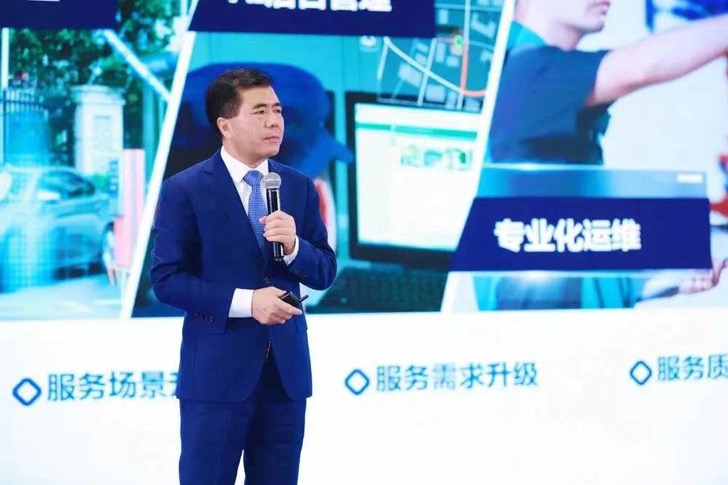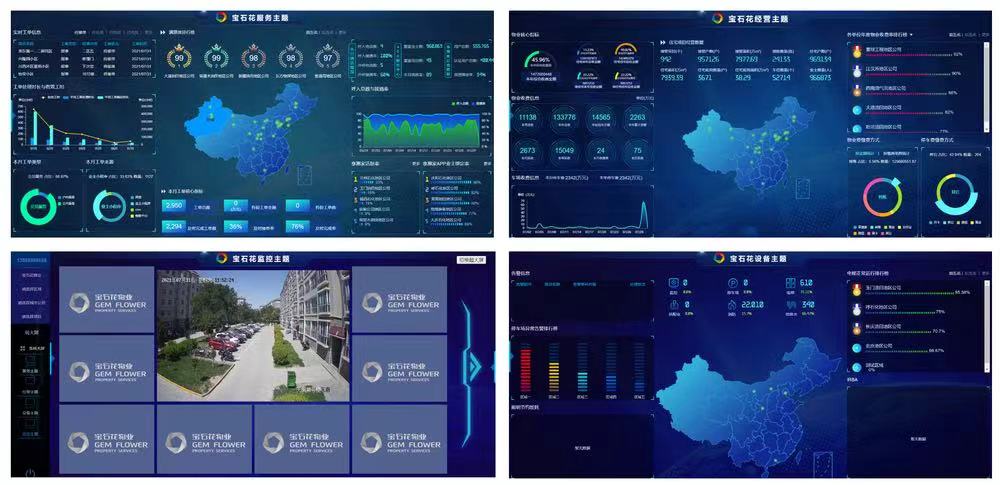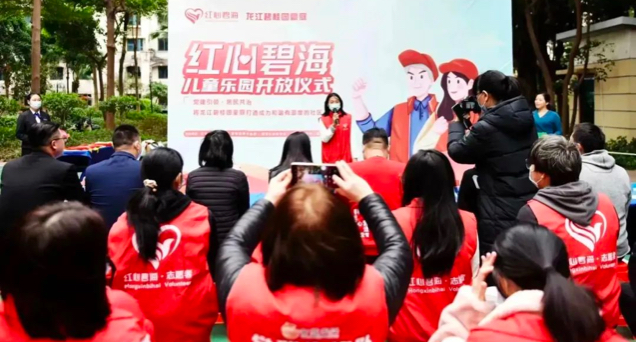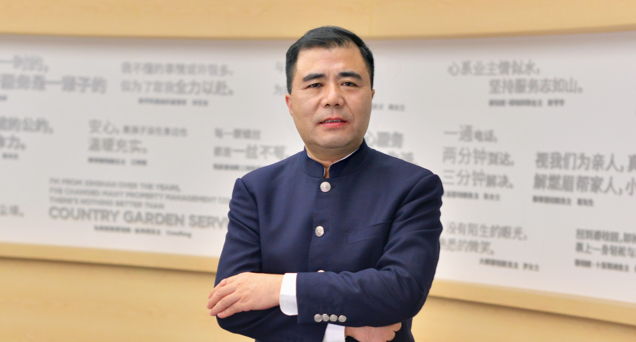
Technologies Are Meant to Serve People

What are the priorities for contemporary Chinese companies?
Digital transformation must be listed among these priorities. On the broad road of digitization, every company desires to get involved and upgrade itself. A survey by IDC has revealed that 84.9% of Chinese companies are undergoing a certain degree of digital transformation.
In 2020, the scale of China’s digital economy has reached nearly USD 55.4 trillion, with the world’s largest growth rate. If we refer to official documents, we will find that in the outline of the China’s 14th Five-Year Plan, by 2025, the added value of the core industries of China’s digital economy is planned to account for 10% of GDP.
However, in the trend of digitization, some companies have mastered the skills after discovering a proper strategy, while other companies are simply applying digitization mechanically. Hence, a ‘narrow gate’ appears on the road to digitization, requiring companies to pass through the ‘narrow gate’ before completing digital transformation.
Being people-oriented rather than ‘showing off technology’
It is common to see several navigation robots strolling in shopping malls, waiting for people to ask for directions or to tap the screen on its chest to unlock other ‘functions’. People initially interacted with these robots out of curiosity, whereas nobody showed their interest towards these robots later.
Unexpectedly, this pseudo-demand symbolized the digital transformation for many shopping malls. Past business revolutions have demonstrated that technology could increase the efficiency of business models, while in actual solutions, many innovative technologies have been divorced from the actual application scenarios and have become a unitary adoration for technique power.
As a consequence, many companies blindly added technology products in order to highlight ‘digitization’, leading to convergent technological investment during a certain period, as well as similar product forms, which finally formed a service standard configuration, turning out to be like those robots without anyone’s attention in shopping malls.
The essence of innovation lies in value creation. Any innovation should be applied to practical application, combined with usage scenarios, and be people-oriented, with people’s demands as its standpoints.
Starbucks, for instance, launched ‘My Starbucks Ideas’ (MSI) back in 2008 to collect user suggestions via Internet for improving service and enhancing user experience. Within six months, more than 75,000 suggestions had been received, many of which were followed by hundreds of comments and affirmative votes.
Starbucks adopted multiple user suggestions to improve its service. For example, Starbucks introduced a reusable ‘spill-proof stick’ after more than 10,000 customers suggested plugging the hole in the lid to prevent coffee from spilling out.
The coffee giant, which has more than 17 million active users on its mobile application, has designed a range of products to suit its customers’ habits by tracking their purchasing behaviors and understanding their characteristics.
After studying how customers order different kinds of coffee in chain stores and combining the results with several industry reports, Starbucks launched K-cup capsule coffee as well as bottled coffee to be sold in shops and supermarkets. The launch of these products was intended to meet different consumers’ diverse needs. Starbucks’s digital transformation was neither merely ‘showing off technology’ nor demonstrating that a coffee company understands big data especially well, but was instead done to improve service quality and provide users with a better experience.
Only by laying emphasis on humanity + technology, can good services be created
The digital transformation of companies has never been about adding a few voice navigation robots in shopping malls or company lobbies, or creating websites/service accounts to collect user suggestions randomly, or creating a CDO (Chief Data Officer) or CIO (Chief Information Officer) position, or upgrading out of a company leader’s personal will or just to conform to trends.
As a matter of fact, in an effort to achieve digital transformation for service-oriented companies, it is more important to understand customers’ real needs through multi-channel exploration, so as to solve the key problems of this industry and realize industry upgrading.
Take for example the facial recognition access control system, which has become a popular innovative mode of property management in many residential areas over the past two years. On the one hand, the use of facial recognition as a household identity verification method qualify as a type of intelligent management, which can identify people’s entries into and exists from the community more accurately, making community management safer and more efficient; however on the other hand, this system also resolves the issue of personal privacy disclosure. Most importantly, the digital management innovation mode upgrade is based on the interests of property companies, rather than owners’ real demands.
In addition to adding face recognition in response to the needs of some owners, communities served by Country Garden Services still retain a variety of ways to enter the communities for owners to choose according to their own circumstances.
“We always believe that technology performs as a means not a purpose, and that only the integration of humanity and technology can create better people-oriented services”, said Li Changjiang, executive director and president of Country Garden Services.

Taking security system, the most basic and vital service content in property management, as an example. Under the traditional working mode, faced with hundreds of camera images being played in a monitoring room at the same time, the staff are dazzled by the huge amount of information, which takes a plenty of time to capture key information. While at present, by the adoption of ‘Tianshi Cloud platform’ with ‘technical eyes’ to assist security personnel, the system can carry out a comprehensive security inspection every five minutes, effectively assisting the front-line staff in safety management.
In addition, housekeepers recorded owners’ requests tin traditional manual style in the past, while Country Garden Services has configured an exclusive APP for each housekeeper, which can carry all the most commonly used functions all the time, such as visits to owners, reports and repairs, owners’ payment matters, gate guard system, and voting activities. Hence, housekeepers can check and update the status of to-do items in real time to efficiently deal with owners’ demands.
Property services are no longer lawn mowers
Thanks to the ‘Tianshi Cloud’, a set of digital products, Country Garden Services has reduced its operation costs. With the support of data-based tools, processes, and technologies, Country Garden Services has gradually transitioned from product- and service-oriented to customer experience-oriented.
It is common to set up Customer Service Departments to obtain service feedback from customers in companies in the past when products and services played the core role. Instead, in the era of digital services, customer experience is regarded as a significant input point and component of a product, rather than simply receiving feedback, which can realize the true co-creation with customers. Country Garden Services has specially set up a customer experience research institute and built a data-driven service experience management system.
Country Garden Services has established the CEM (Customer Experience Management) platform with nearly 100 online and offline service contacts, covering almost 2,500 projects. Owners can score their property management companies anytime and anywhere through various channels such as the Fenghuanghui application, WeChat, and the 400-number Customer Service Hotline. In addition, property owners can even take a picture of their residential estates while walking in the community and have AI recognition technology capture their immediate needs and pop up scenarios-based questionnaires for owners to score their property management companies. Statistics show that more than 453,000 owners update their ratings every month, including comprehensive satisfaction, single item satisfaction, and contacts evaluation.
At the same time, combined with the community spatial database provided by Country Garden Services, each problem raised by owners can be identified through the spatial database to locate specific projects with low evaluations, and immediately form a work order for rectification. This kind of real-time data analysis enables front-line property management staff to quickly and perceptively capture the changes in the trend or common characteristics, so as to recommend personalized services more in line with owners’ needs.
Previously, companies’ digitization tended to be online, but now more attention are paid to the digitization of service processes, such as arranging more contacts both online and offline for collecting and understanding owners’ demands in a timely manner.
“A well-done property company’s performances are more than clean lawn and well-trimmed leaves, but also providing owners services by perceiving their personalized needs. This should be property companies’ core service content”, said Yuan Hongkai.
With more contacts, more information can be obtained, which expanded the imagination space based on customer experience management. When the data flow has satisfied the company’s internal needs, Country Garden Services’s digital business needs to vertically expand upstream and downstream ecological partners as well.
Gem Flower Property Services is a typical case of being empowered by the Tianshi Cloud platform. Gem Flower Property Services is hatched by Gem Flower Home Investment Management Co., LTD., a joint venture company established by Country Garden Services and Strait Energy Co., LTD. jointly. In order to solve original problems of scattered management, inaccessible data, dependence on manual labor, and single service models, Gem Flower Property Services adopted the Tianshi Cloud digital solutions provided by Country Garden Services.
The system comprises four service systems and one IOC data center. After adopting the platform, Gem Flower Property Services stepped forward to a digital community, such as building the Gem Flower Property Services National Operation Center of Information Management, a unified customer service call center of property services, and a convenient life service application for community owners, and creating a multi-dimensional work assessment mechanism for project employees, which formed a set of full life-cycle management system for property service process in line with its own characteristics.

“We are quite open when cooperating with other companies since we do not want to be perceived as merely offering SaaS products. Actually, we are helping companies build digital capabilities so that the system can meet their users’ needs.” Yuan Hongkai also pointed out that the ultimate landing standpoint is still on the basis of users’ demands.
As stated at the beginning of this essay, companies are required to pass through the ‘narrow gate’ before completing digital transformation. ‘People’s demands’ perform as the narrow gate on the road of company digitization. No matter how technologies and applications are iterated and updated, people’s demands and experience will remain as a core goal. Only passing the gate can complete the true transformation.





